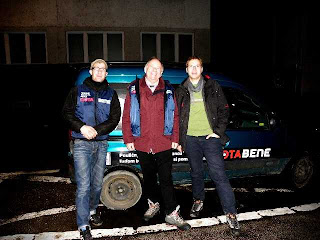Bratislava, Slovakia. Two former students working for Nota Bene, the Slovakian equivalent of St Mungo’s, take me out on a ‘finding’ evening (as opposed to a static evening, where they serve soup at a known location and people come to them). they translated this as street-walking - I said that had other impolications. Nota Bene was founded some years ago from the Comenius University school of social work (which I am visiting) as a practical project, operating alongside their project for drug users.
Link to the Nota Bene streetwork site: http://www.notabene.sk/?streetwork
Hefting a giant medical kit, and rucksacks with flasks of hot soup and other possible needs, we find the Commander and his female friend nesting behind a barrage of large dustbins in a covered area surrounded by flats. A radio is quietly playing. Shouting ‘Good evening, Nota Bene’, as a warning several times, Pauli wheels a dustbin away to reveal them camped on the ground under a hot air vent from a restaurant.
I am introduced. ‘Ah, English’, says the Commander, remembering his smattering of many languages from a long gone sea-going career. He announces he will play a serenade for me, and a passable harmonica rendition of ‘She’ll be coming round the mountain’ assails the night air. Various local residents come by to drop in their rubbish, or walk their dogs, while Sergio unpacks the medical kit. A lady in a blue coat hovers.
Helping the Commander to pull off his boots, Sergio unpicks soiled bandaging, and re-dresses the Commander's ulcerated legs, spraying with antiseptic and smoothing in paraffin cream, while Pauli hands a mug of soup to the lady. A cheerful conversation ensues throughout the long period of dressing. Trainers are produced from a rucksack, softer than the sodden boots, which are left to dry by the air vent. They ask for a new coat, but only a sweater is offered. Nota Bene does not get enough clothes donated: the Commander already has a coat, so a new one is not a priority.
We wheel the dustbin barrage back, and the blue-coated lady engages us in conversation. She is a local resident who sometimes helps the two rough-sleepers, wanted to know what we were doing. It’s good she is positive, not everyone agrees with helping homeless people.
The Commander apparently, is a fixture with his harmonica in a local food market, making enough money to get by. They will be back in a few days to check on his legs again.
A drive through the outskirts of the capital brings us to an area of semi-derelict garages by a railway line. The laptop is extracted from its concealment, and checked: every known living site in the City for homeless people is noted with multicoloured flags in Google Earth, which gives an overhead photography view guiding them to the exact garage. the new social worker uses technology. The garage is occupied by a family who own this property, but no house or flat. A number of possibly aggressive dogs wander around, Sergio emerges from the van cautiously, morsel in hand to tempt a canine appetite.
But no, the dogs are in the control of various members of the family. A visitor from another town tries to extract a donation, but they are all drinking and invading their territory seems unwise.
Another drive, and we park nose forward for a quick getaway about 50 metres from a thriving main road, in some fields by a derelict house. Conversation is audible from an upstairs room, but the people living here do not respond to cheerful calls of ‘Nota Bene’. They are perhaps in the midst of drug-taking or glue-sniffing.
A passer-by has alerted their control centre to possible incursions in a redundant school in a nice area of town. It is in darkness when we get there, and local residents do not answer their doorbells. Eventually, Sergio and Pauli clamber over a fence, more calls of ‘Good evening, Nota Bene’, and, powerful torches in hand, search around the building, then go in. Nothing; perhaps a homeless occupant has moved on, or lies doggo or drunk.
Driving back to the main road, we see some more garage blocks, backing on to some derelict land by another railway. These are unknown to them: ‘Just the sort of place for us’. So we get out and wander round. But these garages are well-kept and locked, we progress on to some abandoned gardens, but there are no signs of nest-making.
That’s it for today: no time to visit a pregnant woman, often abused by her partner and living under railway arches some way away. She is slated for a visit tomorrow.
Bratislava has only limited hostel accommodation, prioritised for people who have had medical treatment. There is little opportunity to get people off the streets. Housing is expensive compared with local wages and the hand out of state housing at the end of the communist regime has led to a shortage of public housing.

No comments:
Post a Comment